鲁科五四制2024四年级英语上册期中提升测试卷(含答案)
文档属性
| 名称 | 鲁科五四制2024四年级英语上册期中提升测试卷(含答案) |
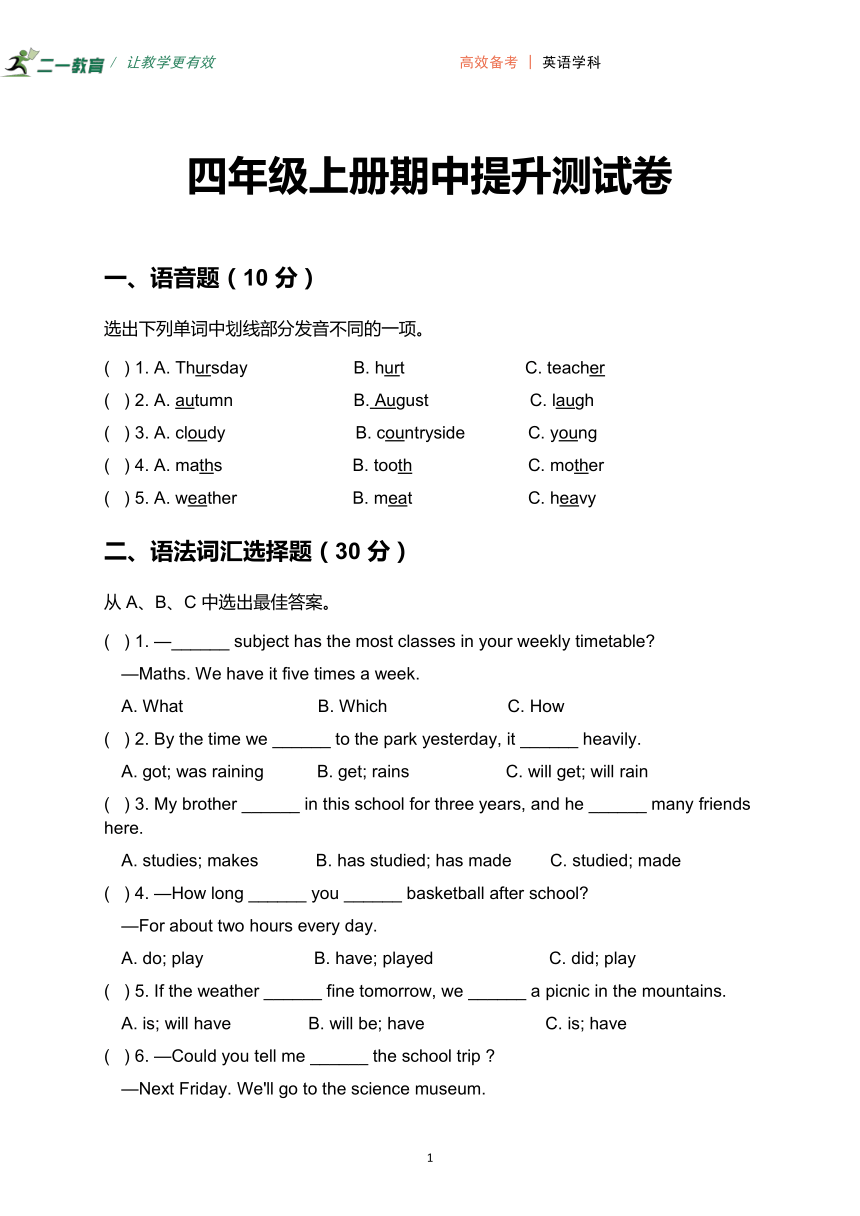
|
|
| 格式 | docx | ||
| 文件大小 | 45.5KB | ||
| 资源类型 | 试卷 | ||
| 版本资源 | 鲁科版(五四制) | ||
| 科目 | 英语 | ||
| 更新时间 | 2025-08-05 00:00:00 | ||
图片预览

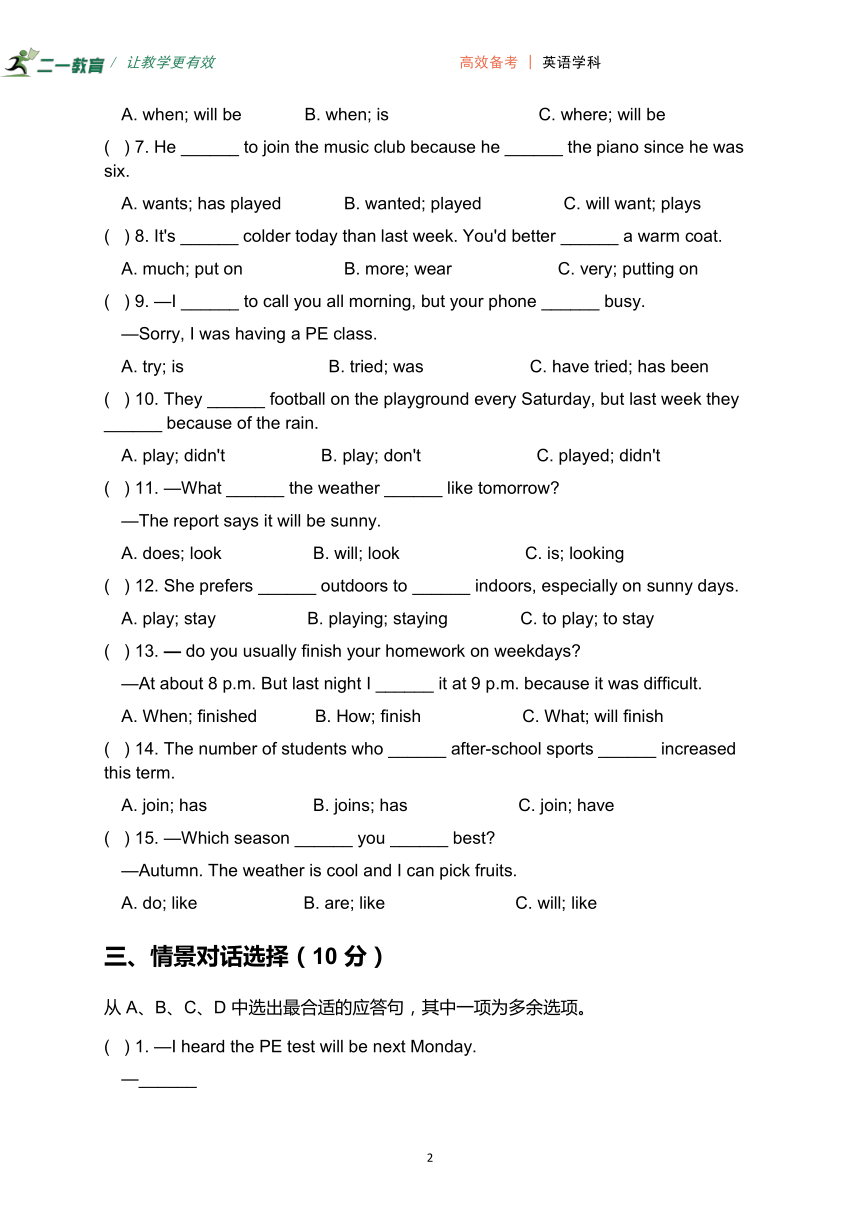
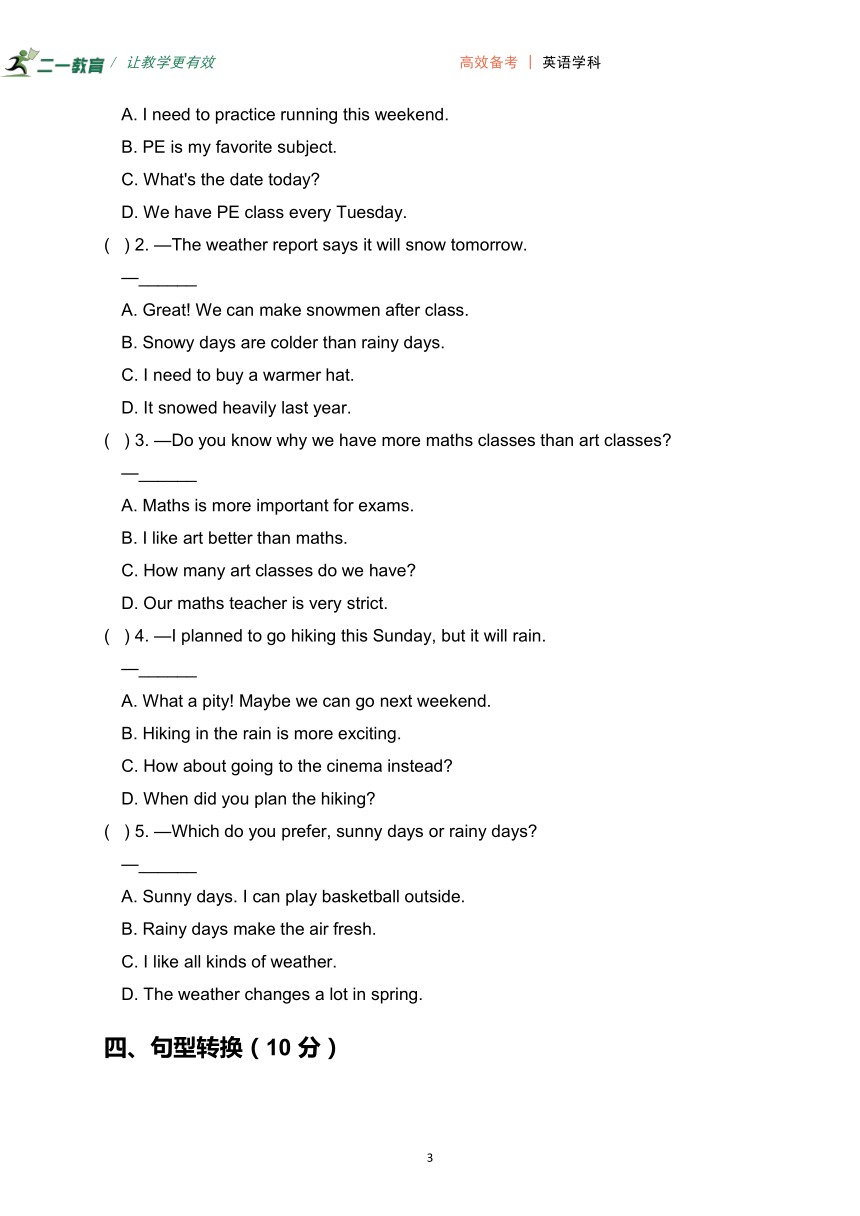
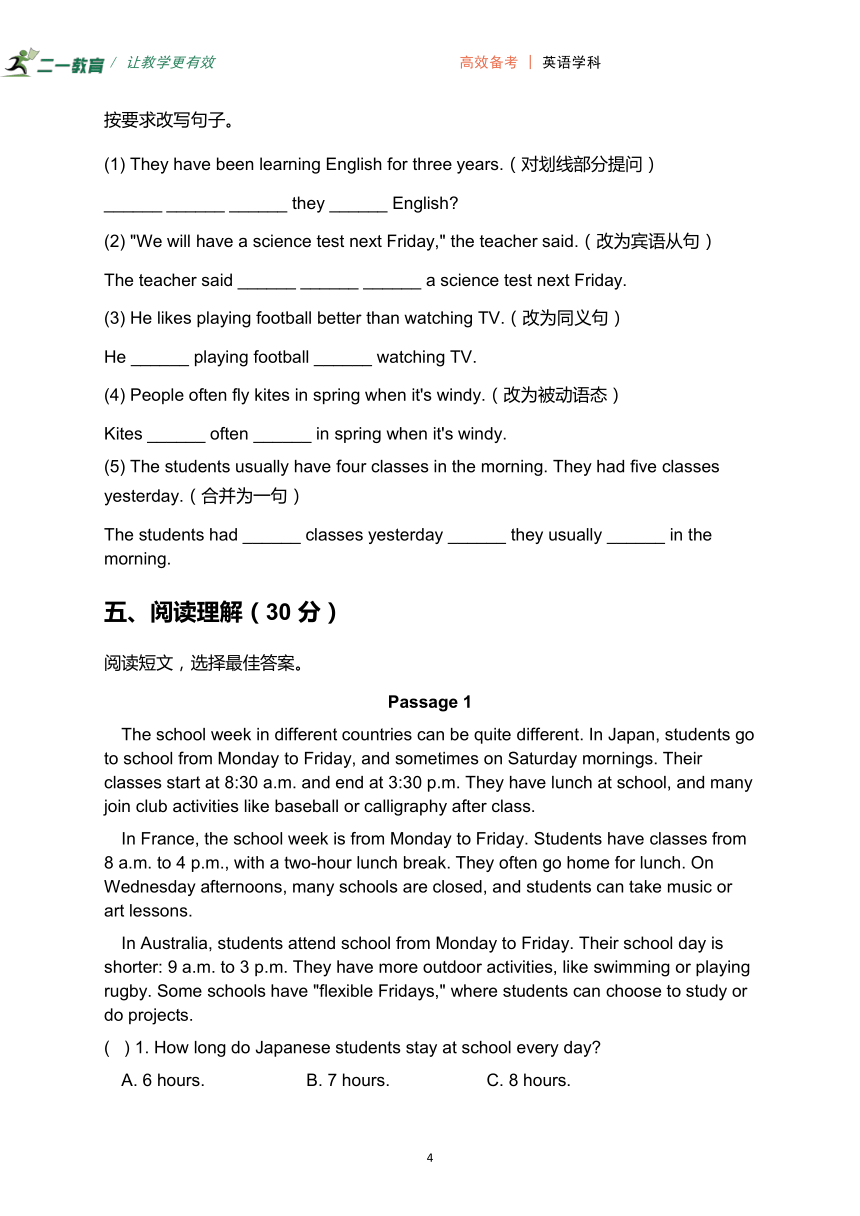
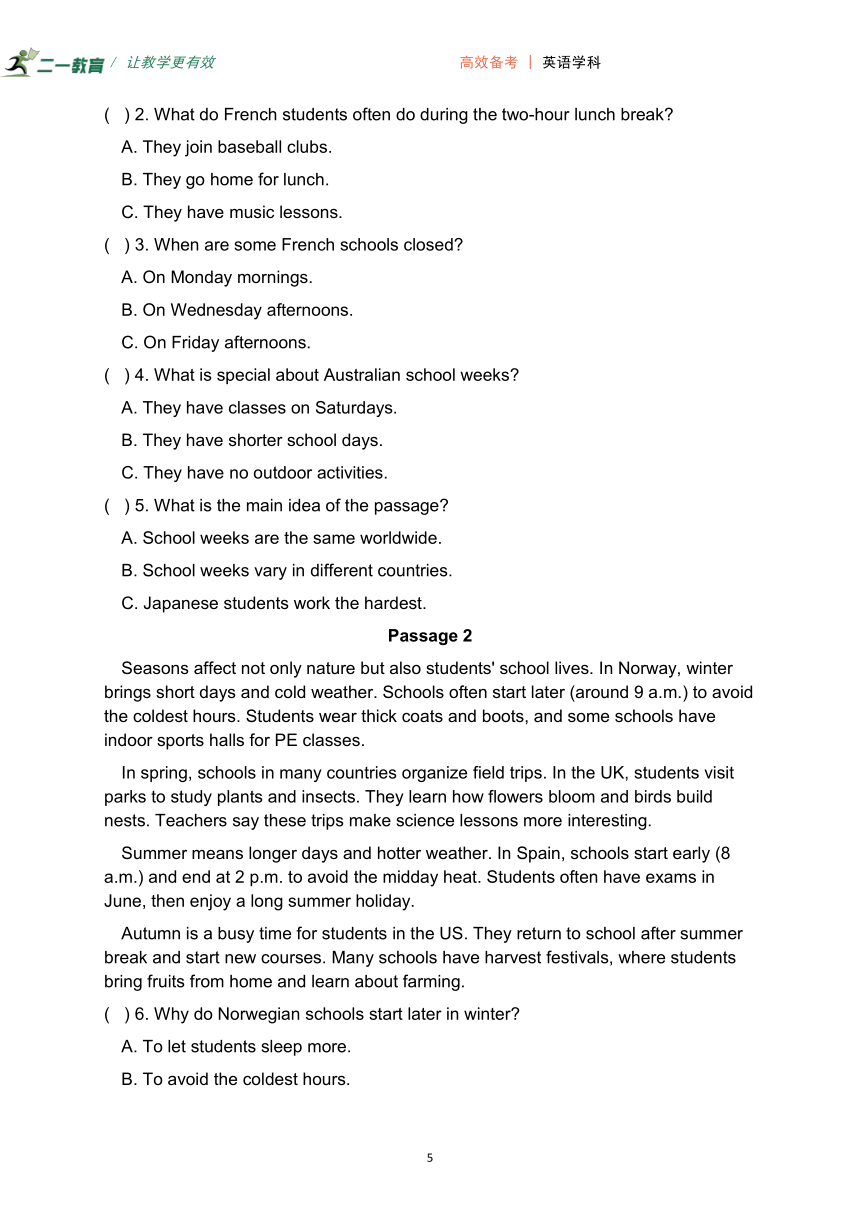
文档简介
/ 让教学更有效 高效备考 | 英语学科
四年级上册期中提升测试卷
一、语音题(10 分)
选出下列单词中划线部分发音不同的一项。
( ) 1. A. Thursday B. hurt C. teacher
( ) 2. A. autumn B. August C. laugh
( ) 3. A. cloudy B. countryside C. young
( ) 4. A. maths B. tooth C. mother
( ) 5. A. weather B. meat C. heavy
二、语法词汇选择题(30 分)
从 A、B、C 中选出最佳答案。
( ) 1. —______ subject has the most classes in your weekly timetable
—Maths. We have it five times a week.
A. What B. Which C. How
( ) 2. By the time we ______ to the park yesterday, it ______ heavily.
A. got; was raining B. get; rains C. will get; will rain
( ) 3. My brother ______ in this school for three years, and he ______ many friends here.
A. studies; makes B. has studied; has made C. studied; made
( ) 4. —How long ______ you ______ basketball after school
—For about two hours every day.
A. do; play B. have; played C. did; play
( ) 5. If the weather ______ fine tomorrow, we ______ a picnic in the mountains.
A. is; will have B. will be; have C. is; have
( ) 6. —Could you tell me ______ the school trip
—Next Friday. We'll go to the science museum.
A. when; will be B. when; is C. where; will be
( ) 7. He ______ to join the music club because he ______ the piano since he was six.
A. wants; has played B. wanted; played C. will want; plays
( ) 8. It's ______ colder today than last week. You'd better ______ a warm coat.
A. much; put on B. more; wear C. very; putting on
( ) 9. —I ______ to call you all morning, but your phone ______ busy.
—Sorry, I was having a PE class.
A. try; is B. tried; was C. have tried; has been
( ) 10. They ______ football on the playground every Saturday, but last week they ______ because of the rain.
A. play; didn't B. play; don't C. played; didn't
( ) 11. —What ______ the weather ______ like tomorrow
—The report says it will be sunny.
A. does; look B. will; look C. is; looking
( ) 12. She prefers ______ outdoors to ______ indoors, especially on sunny days.
A. play; stay B. playing; staying C. to play; to stay
( ) 13. — do you usually finish your homework on weekdays
—At about 8 p.m. But last night I ______ it at 9 p.m. because it was difficult.
A. When; finished B. How; finish C. What; will finish
( ) 14. The number of students who ______ after-school sports ______ increased this term.
A. join; has B. joins; has C. join; have
( ) 15. —Which season ______ you ______ best
—Autumn. The weather is cool and I can pick fruits.
A. do; like B. are; like C. will; like
三、情景对话选择(10 分)
从 A、B、C、D 中选出最合适的应答句,其中一项为多余选项。
( ) 1. —I heard the PE test will be next Monday.
—______
A. I need to practice running this weekend.
B. PE is my favorite subject.
C. What's the date today
D. We have PE class every Tuesday.
( ) 2. —The weather report says it will snow tomorrow.
—______
A. Great! We can make snowmen after class.
B. Snowy days are colder than rainy days.
C. I need to buy a warmer hat.
D. It snowed heavily last year.
( ) 3. —Do you know why we have more maths classes than art classes
—______
A. Maths is more important for exams.
B. I like art better than maths.
C. How many art classes do we have
D. Our maths teacher is very strict.
( ) 4. —I planned to go hiking this Sunday, but it will rain.
—______
A. What a pity! Maybe we can go next weekend.
B. Hiking in the rain is more exciting.
C. How about going to the cinema instead
D. When did you plan the hiking
( ) 5. —Which do you prefer, sunny days or rainy days
—______
A. Sunny days. I can play basketball outside.
B. Rainy days make the air fresh.
C. I like all kinds of weather.
D. The weather changes a lot in spring.
四、句型转换(10 分)
按要求改写句子。
(1) They have been learning English for three years.(对划线部分提问)
______ ______ ______ they ______ English
(2) "We will have a science test next Friday," the teacher said.(改为宾语从句)
The teacher said ______ ______ ______ a science test next Friday.
(3) He likes playing football better than watching TV.(改为同义句)
He ______ playing football ______ watching TV.
(4) People often fly kites in spring when it's windy.(改为被动语态)
Kites ______ often ______ in spring when it's windy.
(5) The students usually have four classes in the morning. They had five classes yesterday.(合并为一句)
The students had ______ classes yesterday ______ they usually ______ in the morning.
五、阅读理解(30 分)
阅读短文,选择最佳答案。
Passage 1
The school week in different countries can be quite different. In Japan, students go to school from Monday to Friday, and sometimes on Saturday mornings. Their classes start at 8:30 a.m. and end at 3:30 p.m. They have lunch at school, and many join club activities like baseball or calligraphy after class.
In France, the school week is from Monday to Friday. Students have classes from 8 a.m. to 4 p.m., with a two-hour lunch break. They often go home for lunch. On Wednesday afternoons, many schools are closed, and students can take music or art lessons.
In Australia, students attend school from Monday to Friday. Their school day is shorter: 9 a.m. to 3 p.m. They have more outdoor activities, like swimming or playing rugby. Some schools have "flexible Fridays," where students can choose to study or do projects.
( ) 1. How long do Japanese students stay at school every day
A. 6 hours. B. 7 hours. C. 8 hours.
( ) 2. What do French students often do during the two-hour lunch break
They join baseball clubs.
They go home for lunch.
They have music lessons.
( ) 3. When are some French schools closed
On Monday mornings.
On Wednesday afternoons.
On Friday afternoons.
( ) 4. What is special about Australian school weeks
They have classes on Saturdays.
They have shorter school days.
They have no outdoor activities.
( ) 5. What is the main idea of the passage
School weeks are the same worldwide.
School weeks vary in different countries.
Japanese students work the hardest.
Passage 2
Seasons affect not only nature but also students' school lives. In Norway, winter brings short days and cold weather. Schools often start later (around 9 a.m.) to avoid the coldest hours. Students wear thick coats and boots, and some schools have indoor sports halls for PE classes.
In spring, schools in many countries organize field trips. In the UK, students visit parks to study plants and insects. They learn how flowers bloom and birds build nests. Teachers say these trips make science lessons more interesting.
Summer means longer days and hotter weather. In Spain, schools start early (8 a.m.) and end at 2 p.m. to avoid the midday heat. Students often have exams in June, then enjoy a long summer holiday.
Autumn is a busy time for students in the US. They return to school after summer break and start new courses. Many schools have harvest festivals, where students bring fruits from home and learn about farming.
( ) 6. Why do Norwegian schools start later in winter
To let students sleep more.
To avoid the coldest hours.
Because of heavy rain.
( ) 7. What do UK students study on spring field trips
A. Plants and insects. B. How to build nests. C. Indoor sports.
( ) 8. Why do Spanish schools end early in summer
To avoid the midday heat.
Because students have exams.
To go on holiday.
( ) 9. What happens in US schools in autumn
Students have field trips.
Students return to school and start new courses.
Schools close for harvest.
( ) 10. How are the school activities in the passage connected to seasons
They all happen in winter.
They match the weather and nature of each season.
They are the same every season.
Passage 3
A study by a team of education experts shows that students' performance varies with the days of the week. They surveyed 2,000 students aged 10-15 from five countries.
The results Monday is the hardest day. Only 30% of students scored high in morning tests, as they were still tired from the weekend. By Tuesday, scores improved to 50%—students adjusted to school routines.
Wednesday was the best day for learning. 65% of students scored high, especially in afternoon classes. Experts think this is because students are fully focused and not yet tired from the week.
Thursday scores dropped slightly to 60%, and Friday saw a bigger drop to 45%. Many students were thinking about the weekend, making it harder to concentrate.
The study suggests that schools should plan important tests and difficult subjects on Wednesdays, when students are most alert.
( ) 11. What did the study survey
A. 2,000 teachers. B. 2,000 students. C. 5 countries' schools.
( ) 12. Why did students score low on Monday
They were tired from the weekend.
They hated tests.
They didn't study.
( ) 13. When did students score the highest
A. On Monday. B. On Wednesday. C. On Friday.
( ) 14. What happened to scores on Friday
They improved a lot.
They dropped to 45%.
They stayed the same.
( ) 15. What suggestion did the study make
Cancel tests on Mondays.
Schedule important tests on Wednesdays.
Make Friday a holiday.
六、书面表达(10 分)
以 “How Seasons Change My School Life” 为题,写一篇短文,至少 6 句。
要求:1. 描述不同季节对学校生活的影响(如课程、活动、作息等);2. 比较不同季节的学校生活;3. 表达对季节与学校生活关系的感受。
参考答案及解析
一、语音题
(1) C 解析:A、B 中 “ur” 发音为 / /,C 中 “er” 发音为 / /,故选 C。
(2) C 解析:A、B 中 “au” 发音为 / /,C 中 “augh” 发音为 /ɑ f/,故选 C。
(3) C 解析:A、B 中 “ou” 发音为 /a /,C 中 “ou” 发音为 / /,故选 C。
(4) C 解析:A、B 中 “th” 发音为 /θ/,C 中 “th” 发音为 / /,故选 C。
(5) B 解析:A、C 中 “ea” 发音为 /e/,B 中 “ea” 发音为 /i /,故选 B。
二、语法词汇选择题
(1) B 解析:询问 “哪一门学科” 用 which,故选 B。
(2) A 解析:yesterday 提示用过去时 got,“when” 引导的从句用过去进行时 was raining,故选 A。
(3) B 解析:“for three years” 提示用现在完成时 has studied;“many friends” 提示用 have made,故选 B。
(4) A 解析:“every day” 提示用一般现在时 do; play,故选 A。
(5) A 解析:if 引导的条件状语从句,主句用将来时 will have,从句用现在时 is,故选 A。
(6) A 解析:由答语 “下周五” 可知询问时间,宾语从句用 will be,故选 A。
(7) A 解析:描述现在的愿望用 wants,“since he was six” 提示用现在完成时 has played,故选 A。
(8) A 解析:much 修饰比较级 colder,had better 后接动词原形 put on,故选 A。
(9) B 解析:“all morning” 提示用过去时 tried,“电话忙” 是过去的状态,用 was,故选 B。
(10) A 解析:every Saturday 提示用一般现在时 play,last week 提示用过去时 didn't,故选 A。
(11) B 解析:tomorrow 提示用将来时 will; look,故选 B。
(12) B 解析:prefer doing to doing 意为 “比起…… 更喜欢……”,故选 B。
(13) A 解析:how 询问 “时间” 用 when,last night 提示用过去时 finished,故选 A。
(14) A 解析:定语从句主语 students 是复数,用 join;the number of 作主语,谓语用 has,故选 A。
(15) A 解析:询问 “喜欢哪个季节” 用 do; like,故选 A。
三、情景对话选择
(1) C 解析:对方说 “体育测试在下周一”,C 选项 “今天几号” 与体育测试无关,是多余选项,其余选项均相关,故选 C。
(2) D 解析:对方说 “明天会下雪”,D 选项 “去年雪下得很大” 与明天的雪无关,是多余选项,其余选项均相关,故选 D。
(3) C 解析:对方问 “为什么数学课比美术课多”,C 选项 “我们有多少节美术课” 未回答原因,是多余选项,其余选项均解释原因,故选 C。
(4) D 解析:对方说 “计划周日徒步但会下雨”,D 选项 “你什么时候计划的” 与调整计划无关,是多余选项,其余选项均为合理建议,故选 D。
(5) D 解析:对方问 “更喜欢晴天还是雨天”,D 选项 “春天天气多变” 未回答偏好,是多余选项,其余选项均回答偏好,故选 D。
四、句型转换
(1) How long have; learned 解析:对时长提问用 how long,现在完成时用 have; learned,故答案为 How long have; learned。
(2) that they would have 解析:宾语从句用 that 引导,时态与 said 一致用 would have,故答案为 that they would have。
(3) prefers; to 解析:like...better than... 同义于 prefer...to...,故答案为 prefers; to。
(4) are; flown 解析:被动语态结构为 are; flown,故答案为 are; flown。
(5) more; than; have 解析:合并为 “昨天的课比平时早上多”,more; than; have 符合,故答案为 more; than; have。
五、阅读理解
Passage 1
(1) B 解析:由 “start at 8:30 a.m. and end at 3:30 p.m.” 可知共 7 小时,选 B。
(2) B 解析:由 “they often go home for lunch” 可知,选 B。
(3) B 解析:由 “On Wednesday afternoons, many schools are closed” 可知,选 B。
(4) B 解析:由 “Their school day is shorter: 9 a.m. to 3 p.m.” 可知,选 B。
(5) B 解析:短文主要讲不同国家的学校周不同,故选 B。
Passage 2
(6) B 解析:由 “start later... to avoid the coldest hours” 可知,选 B。
(7) A 解析:由 “visit parks to study plants and insects” 可知,选 A。
(8) A 解析:由 “end at 2 p.m. to avoid the midday heat” 可知,选 A。
(9) B 解析:由 “return to school after summer break and start new courses” 可知,选 B。
(10) B 解析:短文活动均与季节天气和自然特点匹配,故选 B。
Passage 3
(11) B 解析:由 “surveyed 2,000 students” 可知,选 B。
(12) A 解析:由 “still tired from the weekend” 可知,选 A。
(13) B 解析:由 “Wednesday was the best day... 65% of students scored high” 可知,选 B。
(14) B 解析:由 “Friday saw a bigger drop to 45%” 可知,选 B。
(15) B 解析:由 “schedule important tests and difficult subjects on Wednesdays” 可知,选 B。
六、书面表达(范文)
How Seasons Change My School Life
Seasons bring different changes to my school life, from classes to activities.
In winter, school starts later because of the cold, and PE classes move indoors. We often have art lessons to make Christmas decorations. Spring means outdoor PE—we play basketball on the playground, and science classes take us to the park to watch flowers. Summer brings early dismissal, and we have swimming lessons twice a week. Autumn is busy with harvest-themed projects; we bring fruits to share and learn about farming.
I like how seasons make school life varied. Winter is cozy, spring is lively, summer is relaxing, and autumn is colorful. Each season teaches me something new!
四年级上册期中提升测试卷
一、语音题(10 分)
选出下列单词中划线部分发音不同的一项。
( ) 1. A. Thursday B. hurt C. teacher
( ) 2. A. autumn B. August C. laugh
( ) 3. A. cloudy B. countryside C. young
( ) 4. A. maths B. tooth C. mother
( ) 5. A. weather B. meat C. heavy
二、语法词汇选择题(30 分)
从 A、B、C 中选出最佳答案。
( ) 1. —______ subject has the most classes in your weekly timetable
—Maths. We have it five times a week.
A. What B. Which C. How
( ) 2. By the time we ______ to the park yesterday, it ______ heavily.
A. got; was raining B. get; rains C. will get; will rain
( ) 3. My brother ______ in this school for three years, and he ______ many friends here.
A. studies; makes B. has studied; has made C. studied; made
( ) 4. —How long ______ you ______ basketball after school
—For about two hours every day.
A. do; play B. have; played C. did; play
( ) 5. If the weather ______ fine tomorrow, we ______ a picnic in the mountains.
A. is; will have B. will be; have C. is; have
( ) 6. —Could you tell me ______ the school trip
—Next Friday. We'll go to the science museum.
A. when; will be B. when; is C. where; will be
( ) 7. He ______ to join the music club because he ______ the piano since he was six.
A. wants; has played B. wanted; played C. will want; plays
( ) 8. It's ______ colder today than last week. You'd better ______ a warm coat.
A. much; put on B. more; wear C. very; putting on
( ) 9. —I ______ to call you all morning, but your phone ______ busy.
—Sorry, I was having a PE class.
A. try; is B. tried; was C. have tried; has been
( ) 10. They ______ football on the playground every Saturday, but last week they ______ because of the rain.
A. play; didn't B. play; don't C. played; didn't
( ) 11. —What ______ the weather ______ like tomorrow
—The report says it will be sunny.
A. does; look B. will; look C. is; looking
( ) 12. She prefers ______ outdoors to ______ indoors, especially on sunny days.
A. play; stay B. playing; staying C. to play; to stay
( ) 13. — do you usually finish your homework on weekdays
—At about 8 p.m. But last night I ______ it at 9 p.m. because it was difficult.
A. When; finished B. How; finish C. What; will finish
( ) 14. The number of students who ______ after-school sports ______ increased this term.
A. join; has B. joins; has C. join; have
( ) 15. —Which season ______ you ______ best
—Autumn. The weather is cool and I can pick fruits.
A. do; like B. are; like C. will; like
三、情景对话选择(10 分)
从 A、B、C、D 中选出最合适的应答句,其中一项为多余选项。
( ) 1. —I heard the PE test will be next Monday.
—______
A. I need to practice running this weekend.
B. PE is my favorite subject.
C. What's the date today
D. We have PE class every Tuesday.
( ) 2. —The weather report says it will snow tomorrow.
—______
A. Great! We can make snowmen after class.
B. Snowy days are colder than rainy days.
C. I need to buy a warmer hat.
D. It snowed heavily last year.
( ) 3. —Do you know why we have more maths classes than art classes
—______
A. Maths is more important for exams.
B. I like art better than maths.
C. How many art classes do we have
D. Our maths teacher is very strict.
( ) 4. —I planned to go hiking this Sunday, but it will rain.
—______
A. What a pity! Maybe we can go next weekend.
B. Hiking in the rain is more exciting.
C. How about going to the cinema instead
D. When did you plan the hiking
( ) 5. —Which do you prefer, sunny days or rainy days
—______
A. Sunny days. I can play basketball outside.
B. Rainy days make the air fresh.
C. I like all kinds of weather.
D. The weather changes a lot in spring.
四、句型转换(10 分)
按要求改写句子。
(1) They have been learning English for three years.(对划线部分提问)
______ ______ ______ they ______ English
(2) "We will have a science test next Friday," the teacher said.(改为宾语从句)
The teacher said ______ ______ ______ a science test next Friday.
(3) He likes playing football better than watching TV.(改为同义句)
He ______ playing football ______ watching TV.
(4) People often fly kites in spring when it's windy.(改为被动语态)
Kites ______ often ______ in spring when it's windy.
(5) The students usually have four classes in the morning. They had five classes yesterday.(合并为一句)
The students had ______ classes yesterday ______ they usually ______ in the morning.
五、阅读理解(30 分)
阅读短文,选择最佳答案。
Passage 1
The school week in different countries can be quite different. In Japan, students go to school from Monday to Friday, and sometimes on Saturday mornings. Their classes start at 8:30 a.m. and end at 3:30 p.m. They have lunch at school, and many join club activities like baseball or calligraphy after class.
In France, the school week is from Monday to Friday. Students have classes from 8 a.m. to 4 p.m., with a two-hour lunch break. They often go home for lunch. On Wednesday afternoons, many schools are closed, and students can take music or art lessons.
In Australia, students attend school from Monday to Friday. Their school day is shorter: 9 a.m. to 3 p.m. They have more outdoor activities, like swimming or playing rugby. Some schools have "flexible Fridays," where students can choose to study or do projects.
( ) 1. How long do Japanese students stay at school every day
A. 6 hours. B. 7 hours. C. 8 hours.
( ) 2. What do French students often do during the two-hour lunch break
They join baseball clubs.
They go home for lunch.
They have music lessons.
( ) 3. When are some French schools closed
On Monday mornings.
On Wednesday afternoons.
On Friday afternoons.
( ) 4. What is special about Australian school weeks
They have classes on Saturdays.
They have shorter school days.
They have no outdoor activities.
( ) 5. What is the main idea of the passage
School weeks are the same worldwide.
School weeks vary in different countries.
Japanese students work the hardest.
Passage 2
Seasons affect not only nature but also students' school lives. In Norway, winter brings short days and cold weather. Schools often start later (around 9 a.m.) to avoid the coldest hours. Students wear thick coats and boots, and some schools have indoor sports halls for PE classes.
In spring, schools in many countries organize field trips. In the UK, students visit parks to study plants and insects. They learn how flowers bloom and birds build nests. Teachers say these trips make science lessons more interesting.
Summer means longer days and hotter weather. In Spain, schools start early (8 a.m.) and end at 2 p.m. to avoid the midday heat. Students often have exams in June, then enjoy a long summer holiday.
Autumn is a busy time for students in the US. They return to school after summer break and start new courses. Many schools have harvest festivals, where students bring fruits from home and learn about farming.
( ) 6. Why do Norwegian schools start later in winter
To let students sleep more.
To avoid the coldest hours.
Because of heavy rain.
( ) 7. What do UK students study on spring field trips
A. Plants and insects. B. How to build nests. C. Indoor sports.
( ) 8. Why do Spanish schools end early in summer
To avoid the midday heat.
Because students have exams.
To go on holiday.
( ) 9. What happens in US schools in autumn
Students have field trips.
Students return to school and start new courses.
Schools close for harvest.
( ) 10. How are the school activities in the passage connected to seasons
They all happen in winter.
They match the weather and nature of each season.
They are the same every season.
Passage 3
A study by a team of education experts shows that students' performance varies with the days of the week. They surveyed 2,000 students aged 10-15 from five countries.
The results Monday is the hardest day. Only 30% of students scored high in morning tests, as they were still tired from the weekend. By Tuesday, scores improved to 50%—students adjusted to school routines.
Wednesday was the best day for learning. 65% of students scored high, especially in afternoon classes. Experts think this is because students are fully focused and not yet tired from the week.
Thursday scores dropped slightly to 60%, and Friday saw a bigger drop to 45%. Many students were thinking about the weekend, making it harder to concentrate.
The study suggests that schools should plan important tests and difficult subjects on Wednesdays, when students are most alert.
( ) 11. What did the study survey
A. 2,000 teachers. B. 2,000 students. C. 5 countries' schools.
( ) 12. Why did students score low on Monday
They were tired from the weekend.
They hated tests.
They didn't study.
( ) 13. When did students score the highest
A. On Monday. B. On Wednesday. C. On Friday.
( ) 14. What happened to scores on Friday
They improved a lot.
They dropped to 45%.
They stayed the same.
( ) 15. What suggestion did the study make
Cancel tests on Mondays.
Schedule important tests on Wednesdays.
Make Friday a holiday.
六、书面表达(10 分)
以 “How Seasons Change My School Life” 为题,写一篇短文,至少 6 句。
要求:1. 描述不同季节对学校生活的影响(如课程、活动、作息等);2. 比较不同季节的学校生活;3. 表达对季节与学校生活关系的感受。
参考答案及解析
一、语音题
(1) C 解析:A、B 中 “ur” 发音为 / /,C 中 “er” 发音为 / /,故选 C。
(2) C 解析:A、B 中 “au” 发音为 / /,C 中 “augh” 发音为 /ɑ f/,故选 C。
(3) C 解析:A、B 中 “ou” 发音为 /a /,C 中 “ou” 发音为 / /,故选 C。
(4) C 解析:A、B 中 “th” 发音为 /θ/,C 中 “th” 发音为 / /,故选 C。
(5) B 解析:A、C 中 “ea” 发音为 /e/,B 中 “ea” 发音为 /i /,故选 B。
二、语法词汇选择题
(1) B 解析:询问 “哪一门学科” 用 which,故选 B。
(2) A 解析:yesterday 提示用过去时 got,“when” 引导的从句用过去进行时 was raining,故选 A。
(3) B 解析:“for three years” 提示用现在完成时 has studied;“many friends” 提示用 have made,故选 B。
(4) A 解析:“every day” 提示用一般现在时 do; play,故选 A。
(5) A 解析:if 引导的条件状语从句,主句用将来时 will have,从句用现在时 is,故选 A。
(6) A 解析:由答语 “下周五” 可知询问时间,宾语从句用 will be,故选 A。
(7) A 解析:描述现在的愿望用 wants,“since he was six” 提示用现在完成时 has played,故选 A。
(8) A 解析:much 修饰比较级 colder,had better 后接动词原形 put on,故选 A。
(9) B 解析:“all morning” 提示用过去时 tried,“电话忙” 是过去的状态,用 was,故选 B。
(10) A 解析:every Saturday 提示用一般现在时 play,last week 提示用过去时 didn't,故选 A。
(11) B 解析:tomorrow 提示用将来时 will; look,故选 B。
(12) B 解析:prefer doing to doing 意为 “比起…… 更喜欢……”,故选 B。
(13) A 解析:how 询问 “时间” 用 when,last night 提示用过去时 finished,故选 A。
(14) A 解析:定语从句主语 students 是复数,用 join;the number of 作主语,谓语用 has,故选 A。
(15) A 解析:询问 “喜欢哪个季节” 用 do; like,故选 A。
三、情景对话选择
(1) C 解析:对方说 “体育测试在下周一”,C 选项 “今天几号” 与体育测试无关,是多余选项,其余选项均相关,故选 C。
(2) D 解析:对方说 “明天会下雪”,D 选项 “去年雪下得很大” 与明天的雪无关,是多余选项,其余选项均相关,故选 D。
(3) C 解析:对方问 “为什么数学课比美术课多”,C 选项 “我们有多少节美术课” 未回答原因,是多余选项,其余选项均解释原因,故选 C。
(4) D 解析:对方说 “计划周日徒步但会下雨”,D 选项 “你什么时候计划的” 与调整计划无关,是多余选项,其余选项均为合理建议,故选 D。
(5) D 解析:对方问 “更喜欢晴天还是雨天”,D 选项 “春天天气多变” 未回答偏好,是多余选项,其余选项均回答偏好,故选 D。
四、句型转换
(1) How long have; learned 解析:对时长提问用 how long,现在完成时用 have; learned,故答案为 How long have; learned。
(2) that they would have 解析:宾语从句用 that 引导,时态与 said 一致用 would have,故答案为 that they would have。
(3) prefers; to 解析:like...better than... 同义于 prefer...to...,故答案为 prefers; to。
(4) are; flown 解析:被动语态结构为 are; flown,故答案为 are; flown。
(5) more; than; have 解析:合并为 “昨天的课比平时早上多”,more; than; have 符合,故答案为 more; than; have。
五、阅读理解
Passage 1
(1) B 解析:由 “start at 8:30 a.m. and end at 3:30 p.m.” 可知共 7 小时,选 B。
(2) B 解析:由 “they often go home for lunch” 可知,选 B。
(3) B 解析:由 “On Wednesday afternoons, many schools are closed” 可知,选 B。
(4) B 解析:由 “Their school day is shorter: 9 a.m. to 3 p.m.” 可知,选 B。
(5) B 解析:短文主要讲不同国家的学校周不同,故选 B。
Passage 2
(6) B 解析:由 “start later... to avoid the coldest hours” 可知,选 B。
(7) A 解析:由 “visit parks to study plants and insects” 可知,选 A。
(8) A 解析:由 “end at 2 p.m. to avoid the midday heat” 可知,选 A。
(9) B 解析:由 “return to school after summer break and start new courses” 可知,选 B。
(10) B 解析:短文活动均与季节天气和自然特点匹配,故选 B。
Passage 3
(11) B 解析:由 “surveyed 2,000 students” 可知,选 B。
(12) A 解析:由 “still tired from the weekend” 可知,选 A。
(13) B 解析:由 “Wednesday was the best day... 65% of students scored high” 可知,选 B。
(14) B 解析:由 “Friday saw a bigger drop to 45%” 可知,选 B。
(15) B 解析:由 “schedule important tests and difficult subjects on Wednesdays” 可知,选 B。
六、书面表达(范文)
How Seasons Change My School Life
Seasons bring different changes to my school life, from classes to activities.
In winter, school starts later because of the cold, and PE classes move indoors. We often have art lessons to make Christmas decorations. Spring means outdoor PE—we play basketball on the playground, and science classes take us to the park to watch flowers. Summer brings early dismissal, and we have swimming lessons twice a week. Autumn is busy with harvest-themed projects; we bring fruits to share and learn about farming.
I like how seasons make school life varied. Winter is cozy, spring is lively, summer is relaxing, and autumn is colorful. Each season teaches me something new!
同课章节目录
